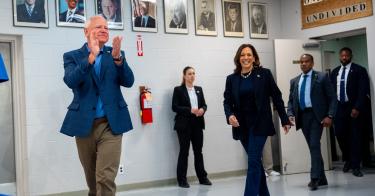As part of their effort to court blue-collar voters, Vice President Kamala Harris and her running mate Minnesota Gov. Tim Walz recently spoke to a Detroit-area group of United Auto Workers union members. Their attempts to rhetorically appeal to a working-class audience fall flat, however, when considered in light of their policies.
Indeed, despite Harris’ chairing the Biden-Harris White House Task Force on Worker Organizing and Empowerment and Walz’s membership in the National Education Association, the policies that this radical duo have enacted stacked the deck against blue-collar workers.
Let’s begin first with the Biden-Harris Administration’s multi-front assault against apprenticeship programs. Apprenticeships are a great way for people to learn the skills they need for a successful career while getting paid instead of paying for a college degree, but there simply aren’t enough apprenticeships.
And yet, the Biden-Harris Administration has been shutting down apprenticeships while massively increasing taxpayer subsidies for college education, including forcing blue-collar workers to pay for white-collar workers’ college degrees.
One month after taking office, the Biden-Harris Administration cancelled new Industry Recognized Apprenticeship Programs that were training people in high-demand areas like nursing and technology, which now face significant workforce shortages.
Next, the Biden-Harris Administration cracked down on existing registered apprenticeship programs with hundreds of pages in proposed regulations that will prevent new apprenticeships from starting and will cause many existing programs to close their doors. Those regulations include eliminating apprenticeships that can be completed in a year or less and those that base completion on participants’ competency.
These actions make it harder for blue-collar industries to fill existing workforce shortages and to expand to provide new opportunities. The construction sector, for example, has a workforce shortage of more than 500,000 workers, but existing government registered apprenticeships only graduate between 40,000 and 45,000 construction workers per year.
Meanwhile, amidst bipartisan calls to bring shop class and other vocational programs back to public education, the Biden-Harris apprenticeship regulation could instead eliminate existing state-administered Career and Technical Education programs by putting them under the federal government’s control.
In addition to clogging the pipelines to blue-collar workforce training, the Biden-Harris Administration is also picking winners and losers among blue-collar workers. Its regulations governing wages and labor agreements on government contracts are disastrous. They almost exclude non-union workers from federal contract jobs, including 89% of construction workers who aren’t unionized; force many workers who perform federal contract jobs into unions, including requiring them to pay into union pensions they’ll never receive.
Not only that, but despite the Biden-Harris Administration’s efforts to empower and unionize more workers, the unionization rate hit a new record low of 10% in 2023 (6% among the private sector), and the gap between union and non-union wages also hit a record low. That’s because union wages increased 6.4 percentage points less than non-union wages between 2019 and 2023.
For Walz’s part, he’s signed a slew of labor laws ostensibly aimed at helping workers, but by driving up the costs and legal liabilities of employing people in Minnesota, they have instead hamstrung job growth in the state. And, of course, job growth is a prerequisite to rising incomes and opportunities.
At the end of the day, Harris and Walz can continue giving speeches and meeting with union leaders, but they can’t avoid reality. Their own policy records undermine their rhetoric, and blue-collar Americans know it.
This piece originally appeared in The Detroit News



